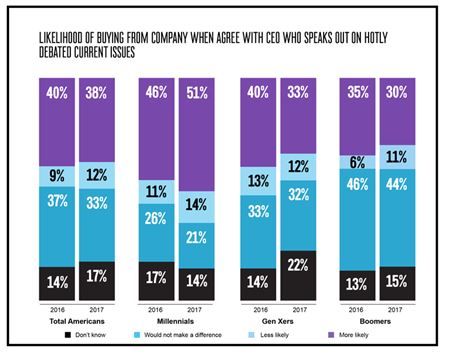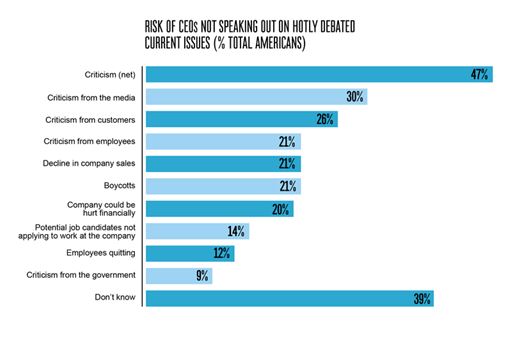Millennial Demand for CEO Activism Surges
NEW YORK, July 24, 2017 – Nearly one-half of Millennials (47 percent) believe CEOs have a responsibility to speak up about issues that are important to society, far outpacing the sentiments of Gen Xers and Boomers (28 percent each).

– New 2017 Weber Shandwick Study on CEO Activism Finds 51 Percent of Millennials are More Likely to Buy From Companies Led by CEO Activists –
An even larger six in 10 Millennials (56 percent) say that business leaders have a greater responsibility to speak out now than in years past. This is according to CEO Activism in 2017: High Noon in the C-Suite, a report commissioned by global communications and engagement firm Weber Shandwick in partnership with KRC Research. This study follows The Dawn of CEO Activism, among one of the first reports published in 2016 that identified the risks and rewards for companies when their chief executives speak out on hot-button issues.
“Over the past 12 months, the climate in the United States has changed dramatically as business and policy have intersected more deeply than ever before,” said Andy Polansky, CEO of Weber Shandwick. “When dozens of CEOs spoke up about the new administration’s decisions regarding issues like climate change and travel to the U.S. from select countries, for example, social media ignited, protests erupted and media attention exploded. Navigating how to communicate a company’s point of view in this environment is becoming increasingly complex and important. Future generations will only pay closer attention to how companies communicate around their values when it comes to deciding where to work or who to purchase from.”
Millennials’ Buying Decisions Increasingly Influenced by CEO Activism
CEO activism positively affects Millennials’ purchase decisions, according to the survey. Half of Millennials (51 percent) say they would be more likely to buy from a company led by a CEO who speaks out on an issue they agree with. This rate has increased since 2016 (46 percent). This form of “voting by wallet” is not to be ignored as companies fiercely compete for customers. By comparison, CEO activism is less likely to affect the purchase decisions of Gen Xers and Boomers.

Millennial Employees Most Loyal to CEO Activist Bosses
The war for talent is hyper-competitive and critical to successful performance. In deciding whether to speak out, it is imperative to consider the effect that CEO activism can have on attracting and retaining talent. More than four in 10 Millennials (44 percent) say they would be more loyal to their organization if their own CEO took a public position on a hotly debated current issue. While there is some risk – 19 percent say they would be less loyal if their CEO spoke out – loyalty outweighs disloyalty by more than twice as much.
For Gen Xers and Boomers, the scales tip toward less loyalty. Only 16 percent of Gen Xers and 18 percent of Boomers would be more loyal if their own CEO spoke out, while two in 10 of each generation (18 percent and 20 percent, respectively) would be less loyal. Before taking a stand on an issue, it is important to address the perspectives and concerns of this older segment of the workforce to better understand what would or would not shift them toward more positive perceptions of their companies.

Additional Findings
In addition to the results outlined above, our research also finds the following:
• Millennials are more likely to have heard of CEO activism (48 percent) than Gen Xers (29 percent) and Boomers (35 percent).
• Millennials are more favorable in general of CEO activism (42 percent) than Gen Xers (25 percent) and Boomers (24 percent). They also exhibit favorability even when an issue is unrelated to the company’s direct business (37 percent Millennials, 19 percent Gen Xers, 17 percent Boomers).
• Half of Millennials (50 percent) think CEO activism has an influence on the government compared to 31 percent of both Gen Xers and Boomers. Perhaps that is a strong reason for why they favor CEOs taking a stand.
• Millennials perceive the primary reason CEOs take a public position on an issue is to get attention in the media (36 percent). This is followed by selling more products or services (22 percent), showing how the issue aligns with their corporate values (21 percent), and building their company’s reputation (21 percent).
• Millennials are most likely to have taken an action because of a CEO’s stance on an issue (74 percent) followed by Gen Xers (63 percent) and Boomers (55 percent). The top action taken by Millennials is talking about the CEO’s stance with people they know. Given Gen Xers’ and Boomers’ general displeasure with CEO activism, it is not surprising that they register their displeasure by boycotting a CEO activist’s company.
A Guide to CEO Activism
CEOs speaking out on hotly debated current issues comes with both risks and rewards, and the generational gap we revealed in response to CEO activism makes these factors even more pronounced. Based on our study, Weber Shandwick identified 15 strategies that CEOs and their companies should consider when approaching activism, 10 of which are below. For more information, click here to read the full CEO Activism in 2017: High Noon in the C-Suite report.
1. Don’t ignore the slippery generational slope. Millennials are moving into the next generation of leadership and they do not want their CEOs to be bystanders.
2. Estimate the price of silence. Millennials are watching.
3. Be fully prepared to commit time and company resources.
4. Look in the mirror to make sure your organization practices what it preaches. You will be held accountable.
5. Consider the channels, messages and tone of voice used when speaking out. Ensure the reasons behind the CEO’s stance are clearly articulated and vetted.
6. Strength in numbers such as petitions, coalitions, etc. might be a viable solution to a steady drumbeat of contentious political and social issues.
7. Have a crisis preparedness plan for a potential social media firestorm.
8. Expect to be asked to speak up the next time a hot button issue arises.
9. Develop a thick skin and anticipate criticism.
10. Establish a firm link between the issue, your company’s values and its business.
About the Research
Weber Shandwick partnered with KRC Research in March and April 2017 to conduct an online survey of 1,021 U.S. adults 18 years of age and older, representing the general population of America. It is the second annual wave in of our CEO Activism research. They survey describes CEO activism to respondents as follows: “In the past year or so, some chief executive officers (CEOs, or top leaders of companies) have spoken out publicly and taken a stand on controversial issues. For example, CEOs have spoken up about social, political and environmental issues such as climate change, income fairness, same-sex marriage, immigration, gun control and discrimination.” The generations are defined as follows: Millennials (ages 18-36), Gen Xers (ages 37-52), Boomers (ages 53-71).
About Weber Shandwick
Weber Shandwick is a leading global communications and engagement firm in 79 cities across 34 countries, with a network extending to 127 cities in 81 countries. The firm’s diverse team of strategists, analysts, producers, designers, developers and campaign activators has won the most prestigious awards in the world for innovative, creative approaches and impactful work. Weber Shandwick was the only public relations agency included on the Advertising Age Agency A-list in 2014 and 2015 and the only PR firm designated an A-List Agency Standout in 2017. Weber Shandwick was honored as PRWeek’s Global Agency of the Year in 2015, 2016 and 2017, The Holmes Report’s Global Agency of the Year in 2010, 2012, 2014 and 2015 and The Holmes Report’s Global Digital Agency of the Year in 2016. The firm deploys deep expertise across sectors and specialty areas, including consumer marketing, corporate reputation, healthcare, technology, public affairs, financial services, corporate social responsibility, financial communications and crisis management, using proprietary social, digital and analytics methodologies. Weber Shandwick is part of the Interpublic Group (NYSE: IPG). For more information, visit https://www.webershandwick.com/
About KRC Research
KRC Research is a global full-service nonpartisan opinion research and strategy firm. A unit of the Interpublic Group of Companies (NYSE: IPG), KRC Research offers the quality and custom service of a small firm with the reach of a global organization. For over 30 years, KRC Research has worked on behalf of corporations, governments, not-for-profits and the communications firms that represent them. Staffed with multidisciplinary research professionals, KRC combines sophisticated research tools with real-world communications experience. For more information, visit www.krcresearch.com